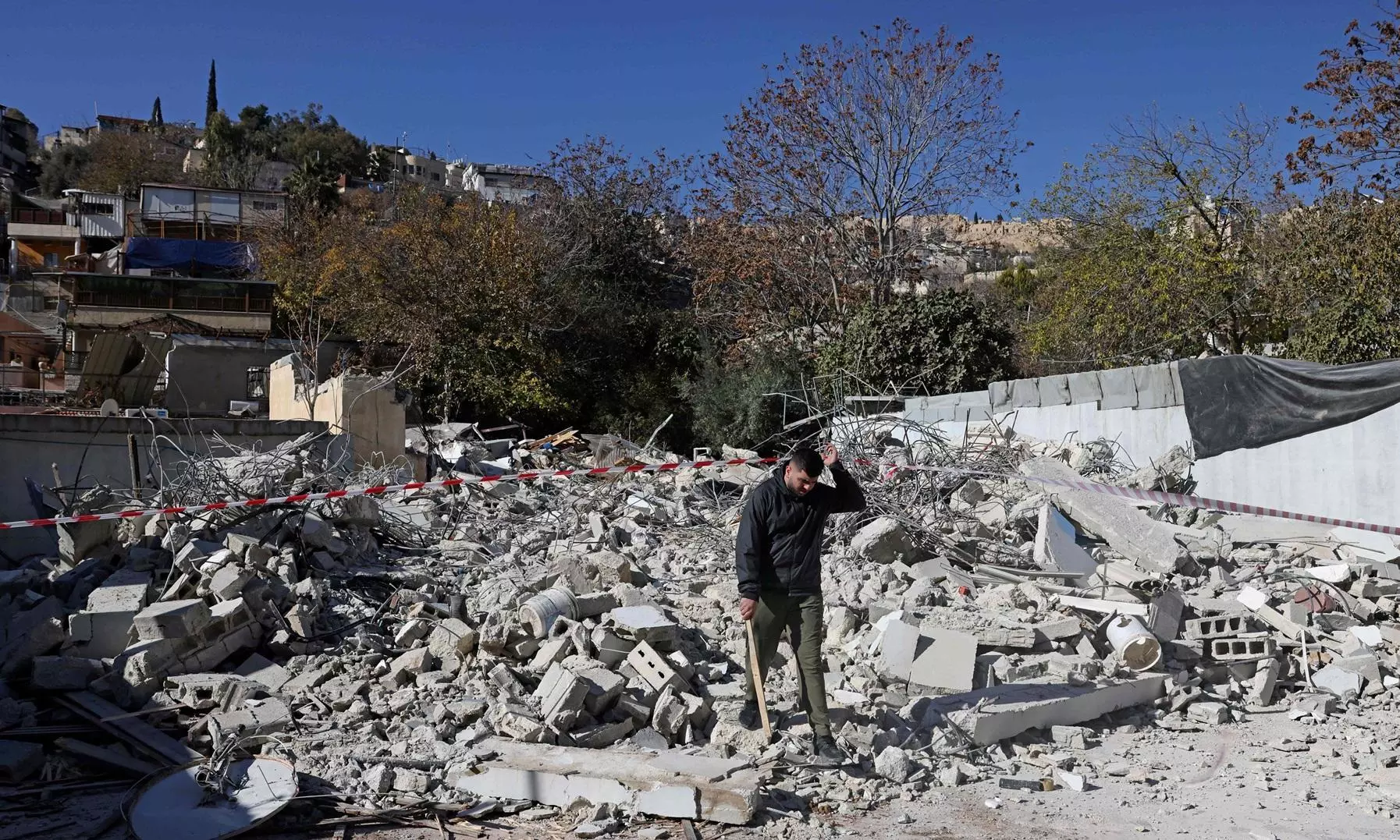
Jerusalem: Exhausted and grieving, Palestinian activist Fakhri Abu Diab stood amid the rubble of his home in Israeli-occupied East Jerusalem, a narrow valley away from the Old City’s famous domes.
In early November, bulldozers from the Israeli-controlled Jerusalem municipality demolished his house for the second time in the Silwan neighborhood due to unauthorized construction.
“They want to expel us from this area,” said a 62-year-old protesting the demolition in Al-Bustan area of Silwan.
The destruction of homes built without permits has plagued East Jerusalem and the rest of the occupied West Bank for years, campaigners say, making it almost impossible for Palestinians to achieve due to Israel’s restrictive planning policy.
Abu Diab’s home was one of about 115 Palestinian residential properties marked for demolition by the Jerusalem Municipality, which controls both the city’s Jewish-majority western part and its Palestinian-majority east, occupied by Israel since 1967.
“They want to erase our presence and drive us out,” Abu Diab told AFP.
“But we will stay in Al-Bustan, in a tent or even under a tree.”
The municipality aims to “tackle illegal construction, allow for proper infrastructure and new public buildings for neighborhood residents,” as well as create green space.
But Israeli rights group Ir Amim said Israeli authorities often abuse areas of East Jerusalem designated as national parks or open spaces.
The group fighting the demolitions said the exercise was designed to stifle “Palestinian development” by “enabling the occupation of their land for Israeli interests”.
The status of Jerusalem is one of the most contentious issues in the Israeli-Palestinian conflict.
Israel captured East Jerusalem, including the Old City, in the 1967 Arab-Israeli War, and immediately annexed the area.
Silwan begins at the foot of the old city walls where the Bible says the City of David was located after the Israelite king captured Jerusalem from the Jebusites.
Today, hundreds of Israeli settlers live among about 50,000 Palestinians in Silwan.
Settlers’ homes are covered with Israeli flags flying from the roofs and windows, as well as ubiquitous security cameras.
Meanwhile, Palestinians in East Jerusalem face a housing crisis amid a rapidly growing population that cannot build without permits.
Abu Diab’s home was first demolished in February. He rebuilt it, but it was destroyed again in November.
“This time, they took me out,” he said, clearly exhausted.
“The original house was built in 1950. I was born, raised, married and raised my children here.”
But now, Abu Deeb said that “even my children had to be hired out of Silwan.”
Now, next to his flat, Abu Deeb lives in a caravan, which is also in danger of being demolished.
He and some of his neighbors rejected the municipality’s offer to relocate to another Palestinian neighborhood in northern Jerusalem.
Near the ruins of Abu Diab’s house, 42-year-old laborer Omar al-Ruwaidi sat in the fire with his son, surrounded by the rubble of his own destroyed house and his four brothers.
“About 30 people, including 12 children, are now homeless,” he said, his voice thick with exhaustion.
“We have been fighting this in court since 2004 and have spent tens of thousands (of Israeli shekels), but to no avail,” Ruwaidi said.
Several families who received demolition orders declined to speak to AFP, citing fear of reprisals.
According to Ir Amim, the destruction in East Jerusalem has increased to unprecedented levels since the start of the Gaza War, which began with a surprise attack by Hamas on Israel on October 7, 2023.
Between January and November 2024, 154 homes were demolished across the region, the group said.
On November 13, bulldozers demolished the Al-Bustan Association community center, whose director said it served 1,500 Palestinian residents, most of them teenagers.
“The association provides various services to its members including skill building, capacity building as well as sports and cultural training,” said Director Qutaiba Auda.
“It was a safe haven and a cultural lifeline in a neighborhood that lacked community centers.”
Auda expressed grief over the loss, saying Israeli officials not only lost the building, but “our memories, dreams and hard work.”
After the collapse, France, which supports activities in the Union, demanded an explanation from Israel.
Among those who frequented the association was 15-year-old Kinda Baraka.
“It was our safe place,” she said.
“When it collapsed, I cried a lot. I felt like they might come and tear down my house.”
Baraka said she believes the demolitions are aimed at pushing Palestinians to side with the settlers.
Ruwaidi echoed those fears but was defiant.
“We will not leave Silwan. We cannot breathe outside Silwan,” he said.